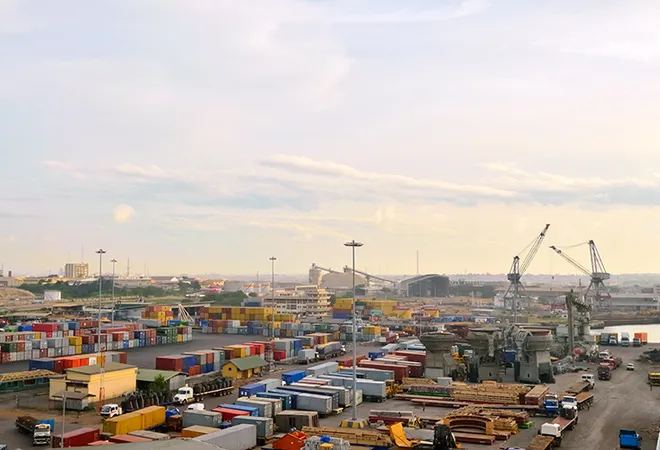
Ghana and India are embarking on a renewed phase of bilateral relations marked by the spirit of solidarity, working for the mutual benefit of their people and diversifying avenues and sectors of cooperation. The basis for our time tested, strong friendship was laid by two visionaries, India’s first Prime Minister Pt. Jawaharlal Nehru and Ghana’s first President Kwame Nkrumah, who shared a close personal bond and friendship.
Ghana, known as Gold Coast then, attained independence from Britain on 6 March 1957, thus becoming Africa’s first country to gain political and economic independence from erstwhile colonial powers. India has consistently lent her support to the anti-colonial and anti-racist liberation struggles of African countries. By 1953, India had already opened its consulate in Accra. After Ghana’s independence, the two countries established full-fledged diplomatic relations.
For many years, Ghana and India have closely worked together and supported each other on international platforms such as United Nations (UN), Commonwealth, and Non Aligned Movement (NAM). Both Nehru and Nkrumah were one of the founding fathers and members of ‘The Initiative of Five’ i.e. Non Aligned Movement (NAM).
For many years, Ghana and India have closely worked together and supported each other on international platforms.
Bilateral trade and areas of cooperation
The synergy which exists between India and Ghana can be gauged from the robust trends in trade relations. In 2011 bilateral trade crossed $1 billion mark for the first time. During the first six months of the fiscal year 2017-2018, bilateral trade stands at $1.7 billion and is expected to reach $5 billion within the next three years. India’s primary exports to Ghana include pharmaceuticals, semi-finished iron and steel, machinery, sugar, plastic products, wood products, and rice. Indian imports include cashew nuts, scrap metal, wood, cotton, oil seeds and spices. India is also the second largest investor in Ghana and has around 700 registered companies.
Trends in India-Ghana trade (value in millions)
| Year |
India’s exports to Ghana |
India’s imports from Ghana |
Total trade |
Trade balance |
| 2012-2013 |
744.12 |
277.61 |
1,021.73 |
466.51 |
| 2013-2014 |
831.48 |
370.56 |
1,202.04 |
460.92 |
| 2014-2015 |
680.39 |
1,257.60 |
1,937.99 |
-577.21 |
| 2015-2016 |
623.73 |
2,981.27 |
3,604.51 |
-2357.54 |
| 2016-2017 |
681.03 |
1,938.54 |
2,620.82 |
-1257.51 |
| 2017-2018 (April-February) |
635.78 |
2,710.58 |
3,346.36 |
-2074.8 |
Source: Department of Commerce, Ministry of Commerce and Industry, Government of India
Discussions have taken place on agricultural productivity and research, rural electrification, and on harnessing nuclear power for development. Some other points of discussion over the years are:
- A $35 million Komenda sugar factory and $24 million facility for cultivation of sugarcane to feed the factory.
- Financing on fish processing projects.
- $30 million facility to update the Yendi water project in Northern Ghana.
- Tema-Akosombo railway lines project.
- Modernisation of agriculture, especially agro-processing.
- Export of heavy duty busses, manufactured by Tata and Ashok Leyland.
- Joint infrastructure projects in railway construction and solar plant development.
The India-Ghana Kofi Annan Center for Excellence in ICT in 2003, and the Presidential Palace in Ghana have been set up through Indian assistance. Till date, the centre has trained over 20,000 Ghanaian students and from other neighboring countries. The centre closely collaborates with the Indian Centre for Development of Advanced Computing (C-DAC) in areas of study such as cyber security, mobile computing, enterprise software, high performance computing among others.
Ghana’s military and defence profile
The Ghana Armed Forces (GAF), formed in 1957 is supervised by the Ghanaian Ministry of Defence. Apart from Nkrumah’s early efforts to expand and modernise the military, subsequent governments, especially in late 1980s and early 1990s, introduced reforms into the military and the entire security architecture of Ghana. A number of democratic principles were introduced and the military was reorganised.
The 1992 constitution gave further impetus to security sector reforms with a particular emphasis on parliamentary control and civilian oversight. Military and civil reforms in Ghana went through incremental stages. Eboe Hutchful breaks these historical processes into four stages. The first stage is characterised by a politicised and democratic military instrumental in creating a new Ghanaian society based on discipline, probity, accountability, justice and patriotism. The second marked the adoption of various concrete strategies and policies to re-professionalise and depoliticise the military. The third saw further reforms and the transition to democracy. The fourth phase, as Hutchful argues, was characterised by the critical role Parliament played since 1992 in civilian control of the military.
There has been a steady increase in Ghana’s military expenditure over the years, from $161.75 million in 2016 to $185.80 million in 2017.
As per the 2018 Global Firepower index, Ghana ranks 107 out of 136 countries and holds a ‘PwrIndx’ (Power Index) rating of 2.3525 (0.0000 being perfect). Its total available manpower stands at 12,500,000 personnel and currently active military personnel at 13,500. There has been a steady increase in Ghana’s military expenditure over the years, from $161.75 million in 2016 to $185.80 million in 2017.
The GAF is now considered as among the most professional in Western African region, specialising in peacekeeping operations with UN, AU and ECOWAS. From 1960 onwards, over 80,000 Ghanaian military, police and civilian personnel have served in various capacities in over 30 UN missions. Ghana is currently the 10th largest troop contributor to UN Peacekeeping operations, and has also played a crucial role in the sub-regional Economic Community of West African States Monitoring Group (ECOMOG) since its inception in 1990.
An integral component of Ghana’s peacekeeping efforts is the Kofi Annan International Peacekeeping Training Center (KAIPTC). Established in 1998 and commissioned in 2004, KAIPTC provides operational training and research to civilian, police and military personnel for conflict prevention, management, resolution, and research in integrated peace support operations (PSOs), especially in ECOWAS region and in rest of Africa. It has run over 400 courses for individuals and hosts Field Training Teams which conducts pre-deployment training courses for GAF and other staff officers designated for UN/AU missions.
India-Ghana defence cooperation and the way forward
While Ghana and India ties are rooted in mutual goodwill, a strong, well-entrenched defence partnership between the two has eluded over the years. India’s defence exports to African countries have traditionally been limited to Eastern African countries and Indian Ocean Island littorals such as Mauritius and Seychelles.
However, a renewed thrust is now being placed on energising defence and security cooperation. India is increasingly looking to diversify its export-import partners, energy sources, and security partners, and is slowly shifting its focus to Western Africa. In this respect, Ghana has the potential to be India’s foremost partner in the region.
A renewed thrust is now being placed on energising defence and security cooperation. India is increasingly looking to diversify its export-import partners, energy sources, and security partners, and is slowly shifting its focus to Western Africa.
Ghana, located in an increasingly volatile region, has been the target of militant terrorism by organisations such as ISIS, Boko Haram, and piracy off the Gulf of Guinea. India, on other hand, has been a victim of cross-border terrorism and is located in-between two nuclear powers. Therefore, India and Ghana are looking to increase defence and security cooperation in order to tackle the scourge of international terrorism, which poses a grave threat to our world and our civilisations. To this end, greater exchanges and cooperation between Kofi Annan UN Peacekeeping Center in Accra, and the Center for UN Peacekeeping in New Delhi is an essential prerequisite. Terrorism needs to be fought jointly, without making a distinction between ‘good’ or ‘bad’ terrorism. Therefore, both Ghana and India have called for early conclusion of negotiations on the Comprehensive Convention on International Terrorism (CCIT).
An emerging area of cooperation is harnessing nuclear energy for civilian purpose. India, being a responsible nuclear power, has demonstrated the potentials of using nuclear energy for bringing development. During Pranab Mukherjee’s visit, at Ghana’s request, India agreed to look into the possibilities of expanding civil nuclear cooperation. Nuclear energy offers opportunities to grow greener economies, and provides a cheap, sustainable alternative to other sources of power both for domestic and industrial use. Ghana has already completed the first phase of its Nuclear Power Programme (NPP) by passing the Nuclear Regulatory Bill which established the Ghana Nuclear Regulatory Authority.
In order for India and Ghana to cooperate on civil nuclear energy for peaceful use and development, specific focus should be placed on the intricate details of cooperation in technology, supply of raw materials, availability of uranium, and sharing of experiences, as both India and Ghana are new in the area of nuclear technology.
Ghana’s electricity demand has been increasing at a fast pace over the last decade due to population growth and economic aspirations. On the contrary, due to high dependence on rain fed hydropower plants, electricity supply has been unable to meet this demand. Therefore, Ghana is looking for investors to develop nuclear power plant for the West African Power Pool project, which is a specialised agency of ECOWAS and aims to integrate the national power systems into a unified regional electricity market.
Given her credentials, India can be a prime candidate. Ghana has no military use of its nuclear assets, and does not intend to develop WMD (weapons of mass destruction). Although India signed a MoU with Namibia in 2009 for the supply of uranium, India’s non-membership to Non-Proliferation Treaty (NPT) is a major stumbling block. Both Ghana and Namibia are signatories to African Nuclear Weapon Free Zone Treaty which prohibits them from supplying uranium to India. Therefore, in order for India and Ghana to cooperate on civil nuclear energy for peaceful use and development, specific focus should be placed on the intricate details of cooperation in technology, supply of raw materials, availability of uranium, and sharing of experiences, as both India and Ghana are new in the area of nuclear technology.
New avenues such as fighting terrorism, using nuclear energy for civilian purpose, and trade in small arms presents Ghana and India with enormous opportunities to further strengthen their defence and security cooperation. Therefore, regular exchange of information and details by technical teams is a necessary prerequisite in order to maintain the momentum in our ties.
John P. Frinjuah, “Decoding the Triumph of Doctrine: The Success of Ghana’s International Peace Support Organisations,” World Peace Foundation, Paper 21, June 2016.
Eboe Hutchful, “Military Reform and Policy in Ghana,” The Journal of Modern African Studies, Cambridge University Press, June 1997.
Global Fire Power, 2018 Ghana Military Strength. Accessed on 14 June.
Ghana Military Expenditure, Trading Economics.
“UNIFIL’s Ghanaian peacekeepers celebrate independence day,” 8 March 2018.
The views expressed above belong to the author(s). ORF research and analyses now available on Telegram! Click here to access our curated content — blogs, longforms and interviews.




 PREV
PREV


